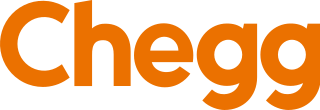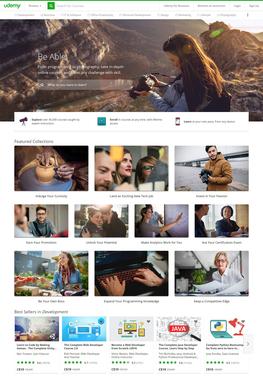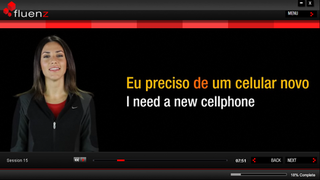Total physical response is a language teaching method developed by James Asher, a professor emeritus of psychology at San José State University. It is based on the coordination of language and physical movement. In TPR, instructors give commands to students in the target language with body movements, and students respond with whole-body actions.

Rosetta Stone Language Learning is proprietary, computer-assisted language learning (CALL) software published by Rosetta Stone Inc, part of the IXL Learning family of products. The software uses images, text, and sound to teach words and grammar by spaced repetition, without translation. Rosetta Stone calls its approach Dynamic Immersion.
ChinesePod is a web-based Chinese language-learning service composed of multiple key components: video and audio lessons, mobile apps and exercises for characters, pronunciation and dialogue. There are also virtual classroom sessions for private lessons with Mandarin Chinese teachers. The service was founded in June 2004 in Shanghai, by Ken Carroll, Hank Horkoff, and Steve Williams.
Livemocha was an online language learning community based in Seattle, Washington. It provided instructional materials in 38 languages and a platform for speakers to interact with and help each other learn new languages. According to the site, it had approximately 12 million registered members from 196 countries around the globe. It was free to join and use; however, it offered the option to pay for various benefits. In 2012, 400,000 users visited the site daily.
Babbel GmbH, operating as Babbel, is a German subscription-based language learning software and e-learning platform, available in various languages since January 2008.

Chegg, Inc., is an American education technology company based in Santa Clara, California. It provides homework help, digital and physical textbook rentals, textbooks, online tutoring, and other student services.

Pimsleur Language Programs is an American language learning company that develops and publishes courses based on the Pimsleur method. It is a division of Simon & Schuster, a publishing company which is a subsidiary of Kohlberg Kravis Roberts. Pimsleur offers courses for 50 languages with English as the source language, and 14 ESL courses.
Duolingo is an American educational technology company that produces learning apps and provides language certification.

Udemy, Inc. is an education technology company that provides an online learning and teaching platform. It was founded in May 2010 by Eren Bali, Gagan Biyani, and Oktay Caglar.

Codecademy is an American online interactive platform that offers free coding classes in 12 different programming languages including Python, Java, Go, JavaScript, Ruby, SQL, C++, C#, and Swift, as well as markup languages HTML and CSS. The site also offers a paid "Pro" option that gives users access to personalized learning plans, quizzes, and realistic projects.
FutureLearn is a British digital education platform founded in December 2012. The company was acquired by Global University Systems in December 2022 and previously jointly owned by The Open University and SEEK Ltd. It is a massive open online course (MOOC), microcredential and degree learning platform.
Voxy is an American eLearning company and English learning platform. The company was founded in February 2010 by Gregg Carey and Paul Gollash and is headquartered in New York City along with an office in São Paulo, Brazil.

Fluenz is a digital language learning platform developed by Fluenz Inc., a U.S. entrepreneurial company. The interactive content can be downloadable or accessed online on computers and mobile devices. The product range consists of programs to learn Spanish as spoken in Latin America, Spanish as spoken in Spain, French, Italian, Mandarin, German, and Portuguese.

Lingua.ly was an EdTech startup that took a digital language immersion approach to teaching languages. The company was founded by Jan Ihmels and Orly Furhman, two academics from Cambridge and Stanford respectively. Lingua.ly operated under the freemium business model and existed as a Cloud-based web app and mobile app available for Android and iOS.
Smigin is a conversation-based language learning platform available online and as a mobile application for iOS and Android. As of March 2016, Smigin has two products: Smigin, a language-learning website and Smigin Travel, a mobile translation app. Smigin's language learning site offers 4 different destination languages across 3 source languages, with several languages in development. Smigin Travel, exclusively designed for the mobile interface, is available on iOS and Android in 11 languages with users in over 175 countries.
Verbling is an online language learning platform that pairs individuals with language teachers via video chat. The company was created at Y Combinator in 2011. In 2015, Verbling raised $2.7 million in series A round funding. Funders have included Draper Fisher Jurvetson, SV Angel, Sam Altman, and Joshua Schachter.
50Languages, formerly Book2, is a set of webpages, downloadable audio files, mobile apps and books for learning any of 56 languages. Explanations are also available in the same 56 languages. It is free except for the optional books, and is cited in research on online language learning.
Mondly is an educational technology company that develops a freemium language learning platform which includes a website and apps with free and paid courses for 33 languages. Mondly is also a pioneer in VR Education, with its most recent launch on Meta Quest being in the top 10 VR apps worldwide. Starting May 2022, Mondly became a part of Pearson.

Xeropan is a gamified language learning application built by English-language teachers.

Lingopie is a subscription-based VOD platform for language learning. The web-based software provides users with television shows and movies combined with interactive language-learning tools. Lingopie offers international content in 10 languages: Spanish, French, Italian, Portuguese, German, Russian, Japanese, Korean, Chinese and English. Lingopie offers a web version and a mobile app available for Android and Apple devices.










